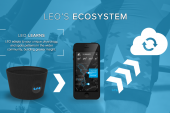
It’s almost a regular summer afternoon outside of the Berkeley Church on Queen Street East as a group of well-dressed men and women gather outside the building. Normally a sign of a wedding reception at the popular events venue, today the suits and dresses mark one of Toronto’s top startup accelerators, Extreme Startups, hosting its bi-annual demo day.
In the startup world, demo days are a common occurrence; almost every startup accelerator hosts more than one throughout the year to showcase its current crop of early stage companies to the outside world. In the case of Extreme Startups, its June demo day saw each of the five startups from its spring cohort–BRIKA, Instaradio, KOGE, Polychart, and Sciencescape–graduate from the program, and give a short presentation on their company and product to an audience made up of friends, family, journalists, and investors.
Matt Voight’s maker page on www.brika.comThe first presentation of the day is held by BRIKA co-founder Jen Lee Koss. Koss starts her presentation with a picture of a cheese board. That cheese board is then followed by a portrait of a seemingly affable man (pictured above). The man in the picture is Matt Voight. He’s the maker behind the cheese board, and helping Voight find success in what he loves to do, says Koss, is what defines BRIKA as a company.
“As a company, we’re all about celebrating and elevating modern craft. We believe in the power of story-telling, and so every day we feature a new maker, their collection of products, and the inspiring story of how they came to do what they’re doing,” tells me Kena Paranjape, BRIKA’s other co-founder, several weeks after the event as she recalls her co-founder’s presentation. At its core, BRIKA is an e-commerce platform that elegantly foregrounds makers like Voight and markets their wares to a large audience of online shoppers.
After finishing her presentation, Koss thanks everyone for attending and gives the stage back to Sarah Prevette, the event’s host. Prevette uses the opportunity to introduce the next startup, Instaradio. After Instaradio finishes its presentation, three more brisk presentations follow and, with that, the event is basically done.
For the five startups that took part in Extreme’s latest cohort, three months of hard work has culminated in what amounts to a five-minute presentation. Whether it’s Extreme Startups or Silicon Valley-based Y Combinator hosting, demo days are the much-hyped conclusion to an accelerator cohort– and while they tend to be over glamourized in the startup community, they do serve a useful purpose.
“To some degree, demo days are becoming quite common, and they’re also being seen as a kind of beauty pageant for startups,” admits Sunil Sharma, one of Extreme’s co-founders. “That said, having a demo day to strive towards helps with building a lot within a short period of time. You have this deadline that is the event and everyone expects you to deliver something great.”
In fact, after having helped accelerate fifteen companies through the program, Sharma has come to the conclusion that perhaps one of the most beneficial aspects of the accelerator experience is the countless deadlines the accelerator’s startups have to adhere to. “I think what’s occurred to me is that one of the biggest advantages of taking part in an accelerator is the sense of urgency that’s created by virtue of having to create a weekly demo,” he says, before adding, “Every Friday, we require all our companies to present to the rest of group what they’ve accomplished in the past week and what they’re planning to work on the following week. The fact that these demos are done without exception encourages the companies to achieve milestones on a weekly basis.”
That sentiment is shared by Paranjape, who says, “A highlight for us was our demo day, and the reason for that is that it forced us to focus on what we had accomplished and what we’re all about. Obviously, we know those things, but it was nice to take a step back and tell that to everyone else.”
That sense of urgency Sharma mentions is also a cause of growth for the companies and their co-founders, though it’s sometimes difficult to see. “It depends on what stage the companies were when they came to the program–and that can vary from company to company–but for the most part, I think there’s an expectation that on their demo day, the companies are still at a very early stage in their life.” However, he adds “The companies grew perhaps more quickly than they would have had they not done an accelerator program.”
That said, on a more personal level, it’s impossible not to grow as an entrepreneur and person going through that kind of an experience and learn a couple of things along the way. “What I learned was to listen feedback and be being open to it. I also learned how to apply what I thought was relevant to my business,” says Paranjape when asked about what she learned going through the program. “I definitely have a tougher skin, but I’m also a lot more open minded.”
Still, despite the obvious growth that both the companies and the individuals running them undergo going through these programs, publications like the Financial Post publish articles that question the value of startup accelerators to the ecosystem. However, if the smiling faces at the Berkeley Church are any indication, the entrepreneurs who took part in the program seem to believe that it was time well spent.
Sharma–who also commented on the Financial Post piece linked above–admits, “I think they’re important, but they’re also only a small component of the overall ecosystem… what I’m noticing is that there are so many companies out there that may or may not be interested in being a part of an accelerator that also have great potential for success.”
Even in the fast-moving world of tech startups, three months is a small amount of time. And while graduating from an accelerator is a meaningful accomplishment, it’s only the start of a startup’s difficult journey, not the end. As Paranjape says, “We’re not in Extreme Startups anymore: Now, we’re just a business that needs to kill it.”
____
Igor Bonifacic is a writer working for the Toronto Standard. You can follow him on twitter @igorbonifacic.
For more, follow us on Twitter @TorontoStandard and subscribe to our newsletter.














